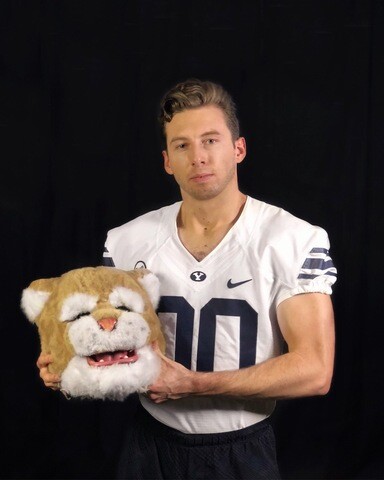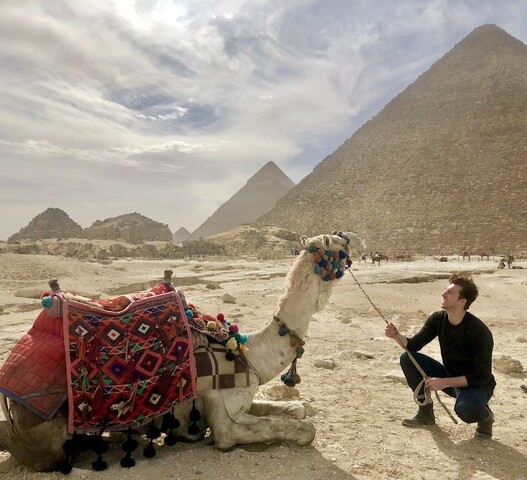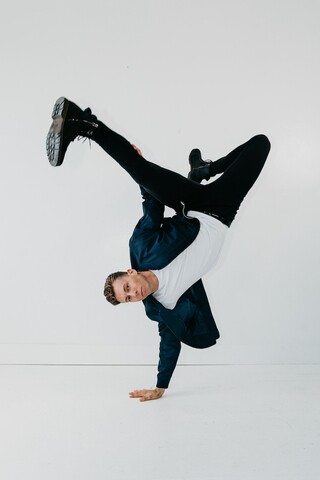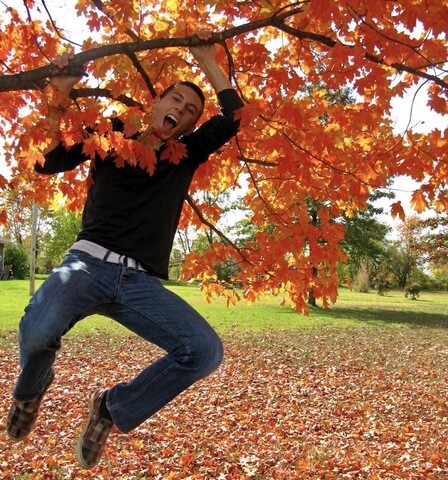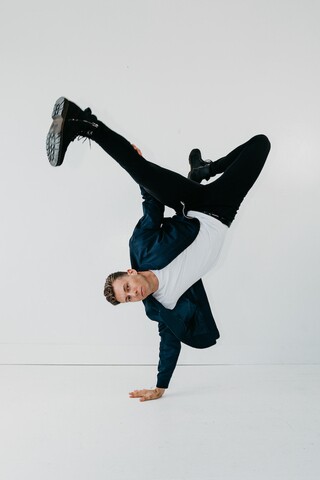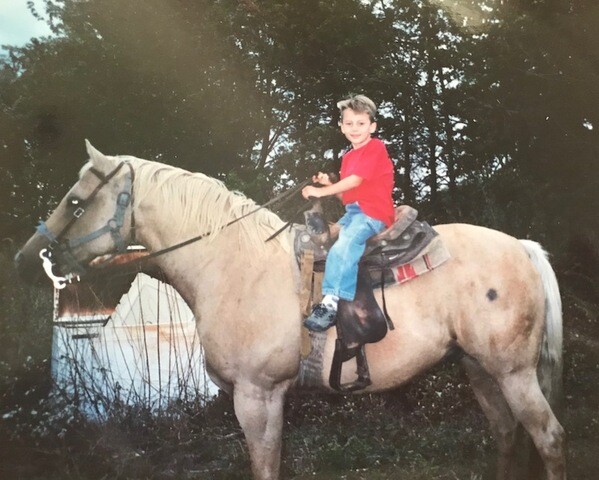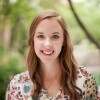Charlie Bird rotated his body in a perfect flip. It was the type of movement that was so familiar, the execution was more than just muscle memory now—it was a part of him. The man who had performed as Brigham Young University’s mascot, Cosmo the Cougar, and who had danced in ESPN’s 2017 College Football Awards, was simply doing what he had always done, defying gravity and soaring through the air.
This time, though, Charlie’s setting was a little more unusual—instead of landing on grass in the LaVell Edwards stadium, the hot sand of the Sahara Desert was beneath his feet. And rather than a backdrop of screaming fans admiring his synchronized hip hop moves with the Cougarettes, the surrounding scenery of the Egyptian pyramids was silhouetted behind him.
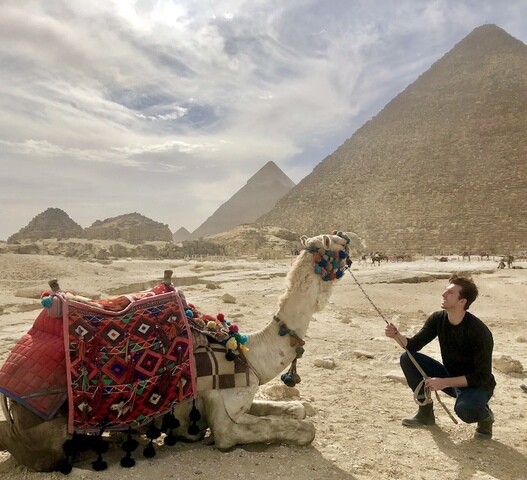
It wasn’t until he returned to Cairo for a business meeting that Charlie plugged in, opened his phone, and realized that back in Utah his Deseret News guest opinion piece had just been published online. In it, Charlie simultaneously came out to the world as gay and revealed his identity as BYU’s beloved mascot from 2015–18.
Responses from his family and friends began pouring in.
“I definitely was freaking out,” Charlie recalls. “I guess the best word I can use to describe it is ‘surreal.’ It was so funny that . . . my life was blowing up—like, the biggest thing that’s ever happened to me—and I was on the opposite side of the world in a completely different situation where I couldn’t dig into that. It was just so surreal.”
The story exploded. After it went live on February 26, 2019, the piece quickly became the #1 trending story in Utah and was covered by local news outlets such as Fox 13 News as well as others across the country, including HuffPost and Yahoo! Finance.
Since then, Charlie’s life has never been the same. The performer, whose influence caused NBC to dub 2017–18 the “Year of the Mascot” and who claimed ESPN’s top spot in a ranking of ‘best mascot moments’ in 150 years of college football history, has now shared his experience about being a gay member of the Church in many ways.
Charlie never dreamed of coming out so openly—it had taken a lifetime to tell his family and friends about his sexual orientation, let alone the world. But he couldn’t ignore the opportunity to support LGBTQ individuals. Most recently, he has taken his story one step further by writing about his perspective as a gay member of the Church in his new book, Without the Mask: Coming Out and Coming Into God’s Light, released by Deseret Book on July 27, 2020.
Coming out and being in the public eye has been anything but easy. But if there’s one thing Charlie has learned from being Cosmo, it’s that there’s power in being himself—and for him, that means taking off the mask.
Christlike Characteristics
As a child growing up on a ranch in southwest Missouri, there were signs early on that Charlie wasn’t like other boys. For instance, he gravitated toward things his sisters liked to do, like late night dance-offs, watching romantic comedies, or doing impromptu fashion shows. He also had a flair for artistic skills such as cake decorating, crafts, and beautiful handwriting, and from a young age he could perform round-offs and back handsprings while making it look effortless.

Charlie also enjoyed what might stereotypically be considered more masculine interests, explains Charlie’s mother, Cathy Bird Wallace. Assuming his other preferences were just a phase, she says that while his being gay may have been in the back of her mind, she didn’t really think twice about it.
Charlie’s interests blessed the Bird family in multiple ways, and everybody knew that Charlie was special, says his sister Anne Bird Rodman.
“This joy that he carried with him as a young child would just radiate off of him,” she says. “People would comment on Charlie all the time, about how special he was. . . . He was one of those kids that you’re just like, ‘That kid’s going places. This kid is a really special young man.’”
Once, Anne recalls being down about a boy she liked in high school when a relationship didn’t work out. But as she sat in her bedroom dreading school the next day, 14-year-old Charlie came in to cheer her up.
“He said, ‘I’m going to help you pick out your outfit, and you’re going to look so good tomorrow,’” she says. “And he blared this music, and at the end he had me dancing, trying on these clothes, and basically he just said, ‘You’re beautiful and wonderful and he’s missing out on a great girl.’ . . . And I think about that all the time—just the way he was able to lift me. I know it’s because he’s gay and he sees the world in a different light. I don’t know very many 14-year-old brothers that would be like, ‘Come on, let’s get you in a rocking outfit.’”
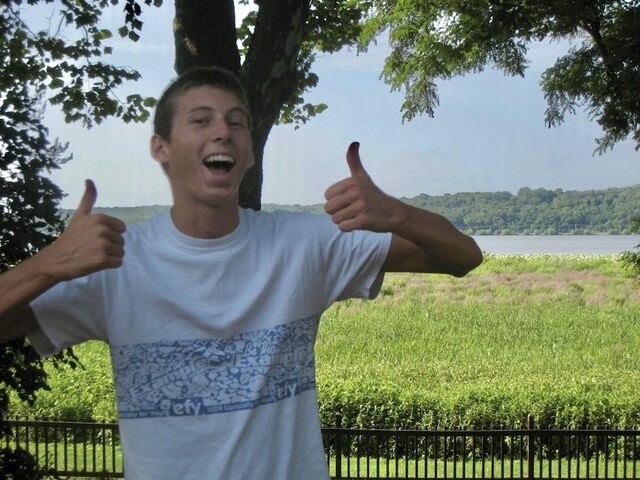
But not everyone saw these traits in Charlie as a positive thing. Sometimes he was teased by his peers for being different, and the fear of being labeled as gay caused him so much anxiety that he tried to hide who he knew he was deep down from others.
“When I first started to see that I was different from other guys, I began formulating this list of rules that I thought would help me fit in better in society,” says Charlie. “And I started hiding my personality and didn’t manifest certain character traits I thought others might consider feminine. And this was all, of course, in hopes that nobody would ever accuse me of being gay. And that was really tough. Looking back, it’s really sad to see how I felt like I needed to change myself in order to conform. And that process—you know, as I did that, I started losing pieces of me.”
Despite his insecurity as a teenager, Charlie learned a valuable and unforgettable lesson from another sister, Janine Bird Wilkins—that rather than conforming to gender stereotypes, he should focus on whether his attributes were like the Savior’s. This helped him better understand his unique talents and gifts and to better minister to others while serving a full-time mission in California.
“A lot of the things I was ashamed of are actually Christlike characteristics that can be seen throughout the Book of Mormon and the New Testament,” says Charlie. “Rather than define my character traits by exclusively feminine or masculine, I should define them by whether or not they were Christlike. And that helped me to be more authentic and also helped me grow closer to the Savior.”
“You’re Charlie”
Still, there were many times when Charlie couldn’t help but wonder if his sexual orientation was a mistake. He wondered if God hated this part of him. But no matter how many girls he dated or how many prayers he offered asking God to change his nature, he was still gay. It wasn’t until he began seeking to understand why he was gay that Charlie went to the temple looking for answers. It was there that he received revelation from God that changed his perspective.
“For most of my life, I lived under the impression that there were these two parts of me that could not exist simultaneously. I felt like my faith and my orientation were like two wolves, and neither of them could survive while the other lived on. But in that mindset, I was disregarding the fact that both of these are integral parts of who I am, and both have shaped my character, and I need to embrace and honor both of those truths in order to feel happy and at peace. I feel very strongly that I am a child of God, and I don’t think God made me by mistake,” he says.
Coming out to his family and friends, though, was a whole other matter. Charlie found himself struggling with depression and self-loathing, and with no one to confide in for much of his life, he felt as though he had to do everything alone.
One of the first in the family to reach out to Charlie unprompted about his sexual orientation was his sister Anne. Not wanting to stereotype or offend her brother, she opted instead for what Charlie affectionately calls the “Anne Approach.” For Anne, this entailed researching stories about LGBTQ members of the Church and watching their videos. Building up rapport with him, Anne would send Charlie positive content she found on a variety of topics—some of which was LBGTQ-related—and he would respond back in kind.
One day, when Charlie shared an article over text with Anne about a man whose background was very much like his own, Anne felt compelled to speak up. More than anything, she wanted to show Charlie that she loved and accepted every part of him.
“I read that story, and I just had this overwhelming feeling that Charlie needed to know that I was there,” she says. “And so, I just sent him a text message in response, and I said, ‘Charlie, I know.’ And I remember my heart was just pounding when I sent that to him. Just a couple minutes later, he wrote back, and he said, ‘I know you know.’ I started crying, and it wasn’t because I was sad or upset. A lot of what I was feeling was just relief that I had been there.”
As time went on, Charlie gradually came out to his family and friends—an experience which he says is similar to the prompting one receives before bearing a testimony on fast Sunday, but multiplied by at least 7,000 times. And while he jokes that the feeling is akin to throwing up or feeling like you’re “going to die,” they have also been some of his most meaningful and spiritual experiences in life.
“A good coming out experience—there’s just something so moving about it, to see and be seen, and to remove barriers and take away these protective layers and courageously show yourself to someone as you are and be met with unconditional love. The Spirit is so, so strong in that moment and it’s a very beautiful, very human experience,” he says.
Unconditional love is most often what Charlie felt from those he shared the truth with about his sexual orientation. Whether he felt inspired to open up to a friend on a road trip, to his brother while hiking Mt. Kilimanjaro, or in a simple setting with his mother, he found acceptance in a way he never could have previously anticipated.
“I think in the very moment [he came out] I was just filled with a sense of unconditional love. I can’t describe it. There was peace in my heart,” recalls Cathy. “When the truth came out fully, I wasn’t afraid of it. . . . I cried with him for the challenges he faced and for some of the things that he had experienced, but I didn’t feel shame. I didn’t feel embarrassment. I didn’t think, ‘What’s my family going to think?’ or ‘What are all his friends going to think? What are the members of the Church and members of my ward going to think?’—I didn’t go there.”
There’s a power, Cathy continues, in openly identifying this aspect about her son that has brought them closer together.

“It probably wasn’t as freeing for me as it was for him, but it was freeing for me because all those things that I’d thought about and maybe stuffed down—I had a place for them now. And yet, my thought process wasn’t, ‘Oh, you’re gay.’ It was, ‘You’re Charlie. And those parts of you that are traditionally thought of as gay traits are what make you so wonderful,’” she says.
Anne notes that understanding Charlie in this new way has been a blessing in her life and in the lives of her family members, helping them to be more accepting of others. While both Anne and Cathy are grateful for the lessons they have learned from Charlie and for the opportunity to support him as an adult, they have still experienced feelings of guilt upon realizing hurtful things they said before they realized he was gay.
“I remember feeling so much guilt after he had come out to me because I had thought, ‘All this time, and I didn’t know. I didn’t know and I didn’t help you. And I remember phrases that I had said, not meaning to offend, but might have just been a dagger to him, and me just being oblivious. And I grieved those times,” says Anne, who adds that she can ask her brother anything now. “Charlie has told me before, ‘ . . . Never be afraid to ask me anything, because I know that it’s coming out of a place of love and wanting to understand, so I’m never going to be offended.’”
Charlie says that identifying as gay helps him communicate with others an important part of who he is. Additionally, being gay is “so much more than just sexual attraction,” as it has also influenced who he is and brought him closer to Christ.
“I think it’s important for people to disassociate ‘gay’ directly with sex or sin, because that’s not what it is. It’s just part of me,” he says. “I use this label ‘gay’ when I want to let people know that I’m a man who’s attracted to other men. And labeling myself as gay doesn’t mean I don’t label myself as a child of God. It just means there’s an important part of me—in this case my sexual orientation —that I often find necessary to communicate to others. And that helps bring people closer and get a better feel for who I am and maybe even some of my life experiences.”
Coming Out—Again
Charlie’s new book, Without the Mask, has been the project of a lifetime—he just never realized it until now. But Cathy isn’t surprised that her son is reaching people in another way.
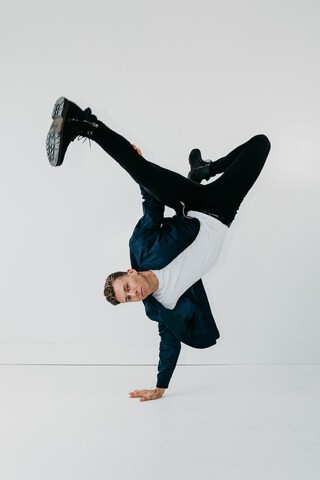
“I always knew he was destined for something spectacular and important,” she says. “I just never knew what it was. And definitely the things that he’s accomplished so far in his life manifest that.”
In the book, Charlie shares some of the dangers that can come from not creating a safe space for LGBTQ individuals to thrive within the Church. If they feel isolated, he says, LGBTQ individuals often turn to coping mechanisms like pornography, anonymous dating apps, and even suicide.
“A lot of times in religious cultures, LGBTQ topics are treated with hostility or sometimes even disgust, and gay individuals become plagued by isolation and guilt. Then, when they feel depressed or misunderstood, they sometimes go to places where they know their sexuality won’t be an issue, and many times those spaces are dark and anonymous and don’t lead to any form of emotional or spiritual health,” he says. “This concept weighs so heavily on me all the time. When we make LGBTQ topics taboo or talk about them in a negative way, they can sometimes have really, really harmful, unseen effects. I’ve seen so many beautiful souls turn to these unhealthy coping mechanisms because they never had a way to operate in a safe, open space.”
In Church culture, members often don’t realize that they have been careless in how they approach or speak about the subject, says Charlie. Being educated about the topic and loving toward those who are LGBTQ will increase the odds that they “will reach out for strength and support from those who truly love and care about them and not to pornography or to strangers on the internet,” he continues.
Including LGBTQ Church members is simple, says Anne. Whether that means extending a calling in the ward, inviting them to sit by you at Church, having them over at your home, or talking to them openly about their experiences, there are plenty of ways to help them feel loved and included as Christ would.
“You can’t just skirt around something that might make you feel uncomfortable,” she says. “It’s wrong to view homosexuality or LGBTQ people that way—this fear of the unknown— because we say we love others. And so it’s time that we start showing that we love others by scooting down on the pew and saying, ‘Sit by me,’ or just love these people. Not with only our words. We can quote all we want, but it’s time to take action and to start actively showing how much we love them.”
One way to show love is to acknowledge misconceptions that might exist in Church culture. One misconception that Charlie points out is that being gay is a choice.
“I would ask them to try and put themselves in my situation. Why would I choose to be gay knowing that it inevitably causes intense spiritual and social complexity?” he asks. “I think that if it were a choice, no one would choose it. But that being said, I can say this honestly, that I really love that I’m gay. I believe God created me intentionally and for divine purpose, and these unique experiences and this world view that stems from my orientation has provided me with incredible opportunities to learn and grow and serve.”
Charlie also speaks about the importance of focusing on positivity moving forward.
“I needed readers to know how painful it is for a gay person to grow up in the Church, but I also needed other gay individuals to know that we can’t bury ourselves in the past,” he says. “Focusing on the future and focusing on positivity and letting myself feel the pain of the past but not letting it define me moving forward—that helped me hold on to the beauty and the truth that’s in the gospel, even though there are these things about Church culture and Church history that don’t sit right with me.”
Shedding Light
“I really never anticipated being Cosmo to give me a platform for gay advocacy. I don’t think anyone could have ever drawn that connection,” Charlie says. “But looking back . . . I really believe that God helped me create this platform as Cosmo so that I could have a voice and be able to shed light on a lot of voiceless people in our community. And so, it’s so incredible to me when I look back at that and see how I was being led and prepared so I can be put in a position where I can have influence. And it’s very humbling—I’m just really grateful when people listen to me.”

Cathy adds that being Cosmo helped Charlie be okay with his identity and placed him in a position to help others today.
“Cosmo was definitely a springboard,” she says. “Charlie explains in his book how he was wanting to hide those things about himself because he thought . . . Cosmo’s this masculine, super athletic character and persona. And yet, when he gave into the real Charlie, that’s when the magic happened. That’s when people accepted him and his dance videos went viral. Ironically, his experiences as Cosmo behind the mask gave him the confidence and courage to take off his own mask.”
Charlie hopes that by “taking off the mask” he will be able to help bring understanding between LGBTQ individuals and the Church. And while he has experienced plenty of ups and downs throughout his journey as a gay Latter-day Saint, he’s discovered that this part of him is one of his greatest spiritual gifts because it has repeatedly brought him closer to the Savior.
“Christ’s love is bold, strong, infinite and unequivocal. There have been times when I’ve scraped and I’ve crawled and felt absolutely worthless. But Christ has never seen me that way. He’s never recoiled, and He never will. He reaches out and lifts me and loves me and waits for me and inspires me and advocates for me, and there’s power in knowing that,” he says.
“I believe He knows exactly what it’s like to be me, a gay member of The Church of Jesus Christ of Latter-day Saints. And He knows how to guide me as I move forward. And each of us is different and nobody’s path looks the same, so I don’t think anyone will ever be able to give a silver-bullet answer on how to reconcile faith and orientation, but Christ can lead us and teach us each individually. And we can each gain peace and inspiration from the Spirit as we move forward. And I think that’s the ticket right there.”
Featured image by Nate Edwards, BYU Photo
All other images courtesy of Charlie Bird and Deseret Book
Charlie Bird—the viral face of BYU during his years as Cosmo the Cougar—made waves across the nation when he came out and revealed to BYU fans that he is gay. Now, in Without the Mask, Bird reflects on how his identity has strengthened his testimony and how he views his sexual orientation in conjunction with his faith in Jesus Christ. Available now at DeseretBook.com.
